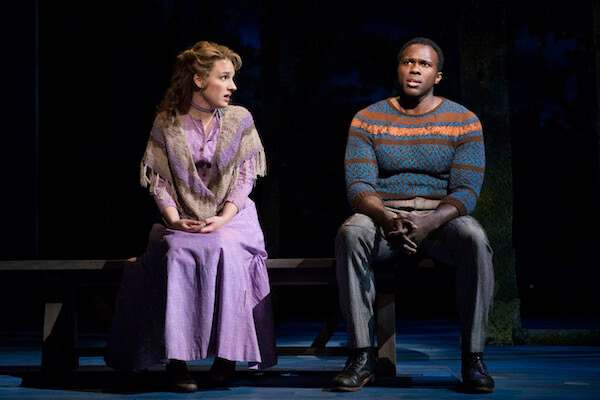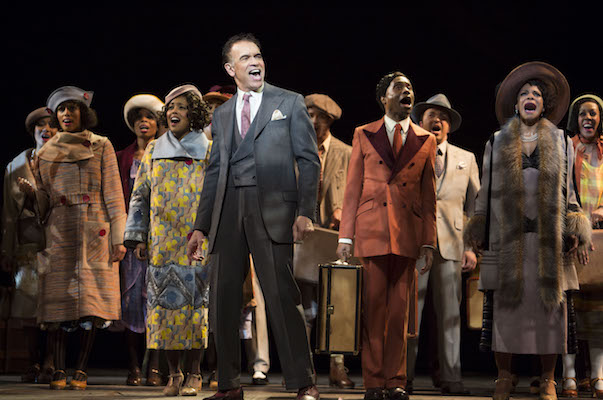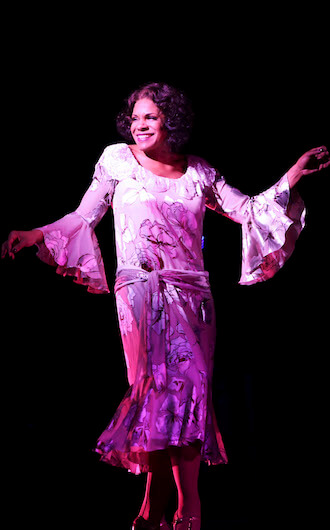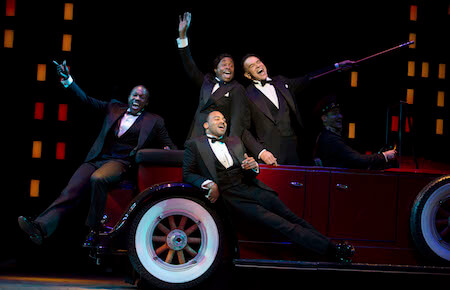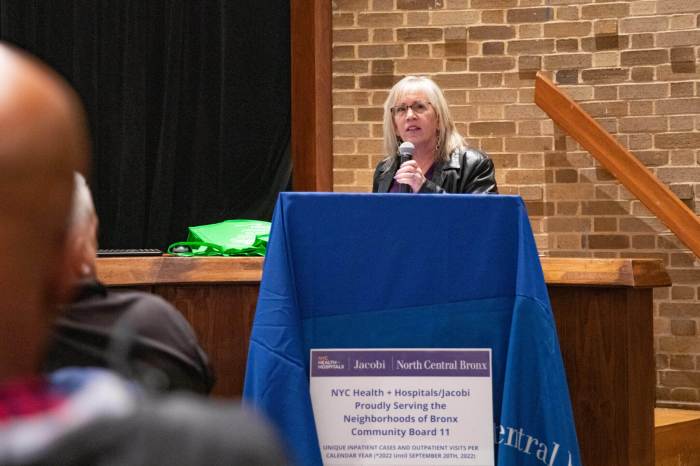Hamish Linklater and Lily Rabe in William Shakespeare’s “Much Ado About Nothing,” directed by Jack O’Brien, in Central Park through July 6. | JOAN MARCUS
BY CHRISTOPHER BYRNE | At just about the point the plot turns dark in Jack O’Brien’s rich, romantic, and lyrical production of “Much Ado About Nothing,” night had indeed descended and there was a chill in the air at Central Park’s Delacorte Theater. While no doubt a matter of serendipity on the evening I attended, it was nonetheless one more pleasure in a production overflowing with them. O’Brien’s smart reading of the play, John Lee Beatty’s lovely Italian villa where it’s set, the gorgeously understated 19th century costumes by Jane Greenwood, and a sublime company make this a production not to be missed.
This is the third “Much Ado” I’ve seen in Central Park, and I can count at least six other productions I’ve seen over the years. Still, this play never fails to engage me in its romantic journey. That’s partly because the play itself is so well structured. The rocky road to love for Beatrice and Benedick, so effectively juxtaposed against the darker plot of Don John trying to ruin the virginal Hero to satisfy his ego, touches such elemental emotions that even when the ending is well known, it’s impossible not to get swept up.
For nearly 400 years, audiences have found ways to project themselves onto this story.
A stellar “Much Ado” under the stars makes magic on summer nights
Here, the battle between Beatrice and Benedick is taken up by Lily Rabe and Hamish Linklater. Both have sworn off love, perhaps because they’ve been too bruised by it in the past, maybe even by each other. Their meetings are characterized by barbs and banter until their friends trick them into thinking one is hopelessly in love with the other.
Rabe, who was a magnificent Portia in “The Merchant of Venice,” demonstrates a superlative gift for comedy inflected with heart. Watching Beatrice’s brash defensiveness melt into an embrace of her wronged cousin and ultimately a clear-eyed love for Benedick is a complete joy.
Linklater, one of the most accomplished comic actors working today, hits all of Benedick’s expected notes. He could probably do that in a walk, but what makes his performance extraordinary is that he creates a multi-layered Benedick, who, for all his swagger, has clearly been damaged by love. As a soldier, though, when called on to do what is morally right, he does so, as much for who he is as out of his growing love for Beatrice. Linklater is a solid leading man who is sensitive and romantic, but can still crack up an audience with a well-timed look.
The unmistakable chemistry between Rabe and Linklater creates much of this production’s charm; even the most cold-hearted person can’t help but smile when they finally make love out of war.
That’s not to diminish the rest of the cast. Ismenia Mendes is lovely as Hero, graceful, delicate, and transparent, where Beatrice is harder edged. Hero falls in love with Claudio, the sturdy and handsome Jack Cutmore-Scott, but their marriage almost goes awry when Don John hatches a plot to make Hero look like “a common stale.”
Pedro Pascal is cramped and angry as Don John — for no reason, other than malice, stamping out plants in the garden as he hopes to compromise his brother Don Pedro, the beloved prince he is forced to follow. Brian Stokes Mitchell is a strong Don Pedro, making an often-overlooked part distinctly and regally his own — even adding his wonderful voice to a couple of songs. Mitchell is marvelous in the darker moments when Don Pedro is fooled into thinking his honor has been compromised by Hero’s disgrace, but he is also unforgettable in the comedy scenes, particularly when laying the trap for Benedick to fall in love with Beatrice.
John Glover is outstanding as Leonato, the governor of Messina in whose villa all this takes place. Glover has an unerring sense of character and language that is put to excellent use in this role. In the comic role of Dogberry, the bumbling constable who discovers Don John’s plot, John Pankow is exactly right, as is the motley crew he has assembled to watch over Leonato and his guests.
This “Much Ado” has been meticulously crafted and is consistently delightful. Jeff Croiter’s lighting brilliantly contrasts sunny days full of romantic games with dark nights overrun with plottings. David Yazbek’s music is fresh and original.
To steal from “Twelfth Night,” this “Much Ado” is so beautifully filled with depth and dreams that it is, indeed, “high fantastical.” So, if O’Brien wants to take credit for the sunset, too, I’m inclined to let him.
MUCH ADO ABOUT NOTHING | The Delacorte Theater, Central Park | Enter at W. 81st St. & Central Pk. W. | Through Jul. 6 | Tues-Sun 8 p.m. | Free; publictheater.org



























